Introduction
In a world increasingly focused on health and wellness, the narrative around dietary fats is evolving, revealing their essential role in achieving optimal well-being. Contrary to outdated beliefs that demonize all fats, emerging research highlights the power of healthy fats in promoting weight management, enhancing energy levels, and supporting metabolic functions.
By understanding the science of fat metabolism and debunking common misconceptions, organizations can empower their teams to make informed dietary choices that not only enhance individual health but also foster a more productive workplace.
As professionals explore effective strategies for incorporating healthy fats into their diets, they can inspire a culture of wellness that prioritizes nutritional health and overall vitality.
This article delves into the multifaceted benefits of healthy fats, offering actionable insights for HR Benefits Managers eager to champion the well-being of their teams.
The Science of Fat Metabolism: How Eating Fat Can Burn Fat
Lipid metabolism represents a sophisticated process through which the body transforms consumed oils into essential components like fatty acids and glycerol, ultimately harnessing them for energy production. Notably, a fat molecule, triacylglycerol, consists of three fatty acids linked to a glycerol molecule, highlighting the structural complexity of fats. Upon consuming fat, the body triggers the release of hormones such as glucagon, which plays a critical role in prompting fat breakdown.
This mechanism is particularly pivotal in ketogenic diets, where the body transitions into ketosis, relying predominantly on fat as its primary energy source rather than carbohydrates. As mentioned by Owen OE, 'Energy metabolism in feasting and fasting,' comprehending these metabolic processes enables individuals to make informed nutritional choices that align with their well-being and weight loss goals. Furthermore, alterations in lipolysis, as discussed in the case study 'Clinical Significance of Lipolysis Alterations,' are often linked to obesity and characterized by increased basal rates of lipolysis and diminished responsiveness to stimulation, promoting insulin resistance and associated disorders.
Emphasizing the importance of healthy fats is essential, as they not only supply energy but also facilitate vital cellular functions and hormone production. This synergy contributes to enhanced overall well-being, making it crucial for HR Benefits Managers to advocate for dietary strategies that support their teams' wellness and vitality. By embracing the science of fat metabolism, professionals can inspire their teams to prioritize nutritional well-being, ultimately fostering a more productive and engaged workforce.
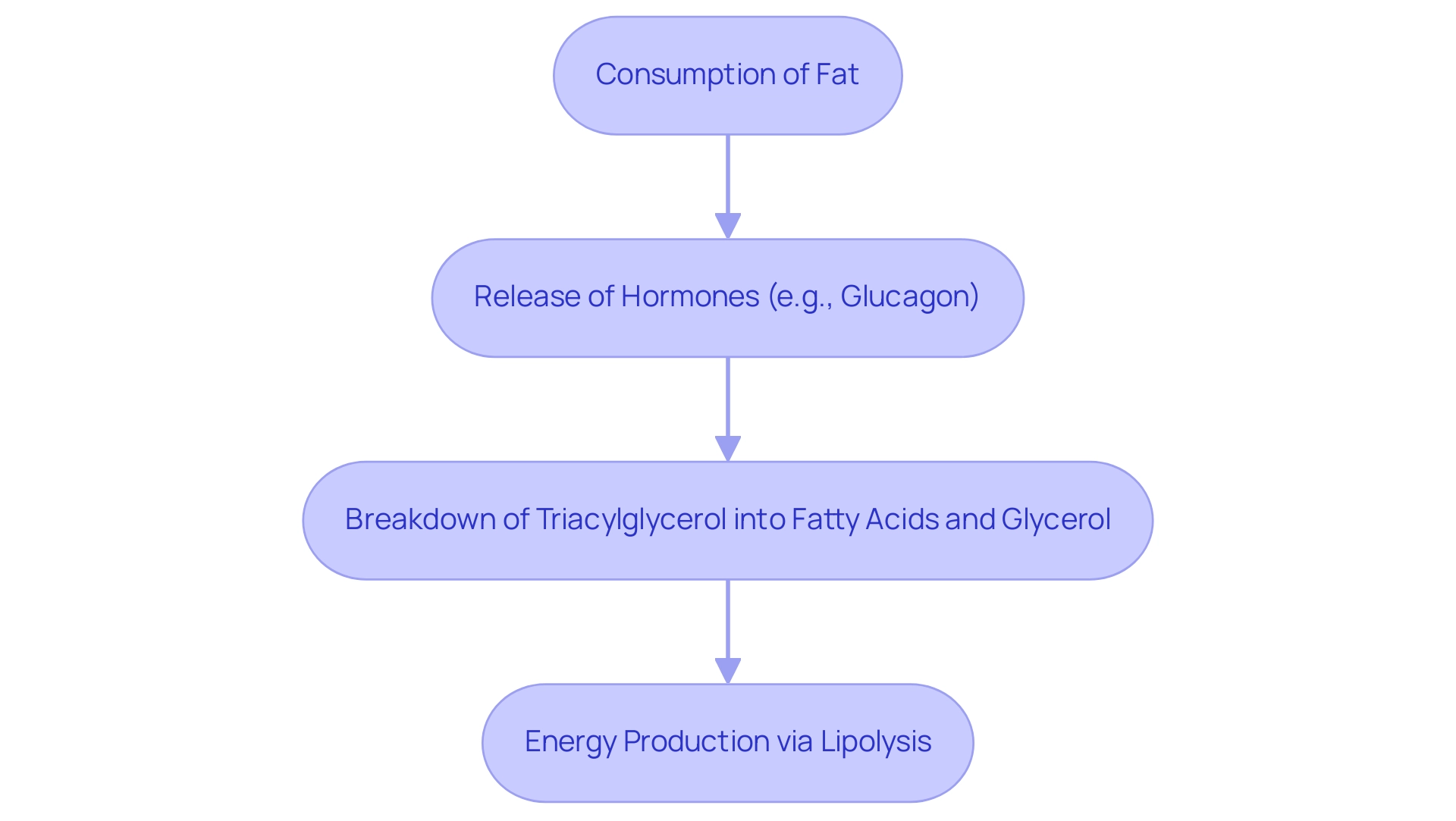
Real-Life Success: How Fat-Heavy Diets Lead to Effective Weight Loss
A growing number of individuals have experienced remarkable weight loss and enhanced health by embracing fat-heavy diets, raising the question of whether eating fat does burn fat, particularly with the Wild Diet. This method emphasizes whole, unprocessed foods while encouraging the intake of healthy oils such as avocados, nuts, and olive oil. Participants on this diet often report not only significant weight loss but also heightened energy levels and improved mental clarity.
As noted by Tong, Sainsbury, and Craig, 'We used the Consolidated criteria for reporting qualitative research (COREQ) reporting guidelines to ensure that we transparently detailed the methods used to achieve our findings,' underscoring the importance of credible reporting in nutritional research. However, it's essential to consider varied experiences; for instance, Savannah Guthrie's attempt at the keto diet yielded no weight loss and low energy despite enjoying the food options. Such contrasting experiences highlight the necessity of individual responses to nutrition changes.
Success stories from various wellness programs demonstrate that integrating healthy fats into daily meals raises the important question of whether eating fat does burn fat, leading to transformative results and significantly elevating individuals' quality of life. By prioritizing these dietary principles and combining them with personalized coaching and support, such as goal-setting, meal planning, and accountability techniques, you can empower your team to make healthier choices that foster both physical and mental well-being. Testimonials from our clients emphasize the effectiveness of our evidence-based approach, showcasing how personalized coaching has led to lasting lifestyle changes.
Let’s work together to help your team thrive by learning from the wisdom of the past and actively engaging in their health journey.
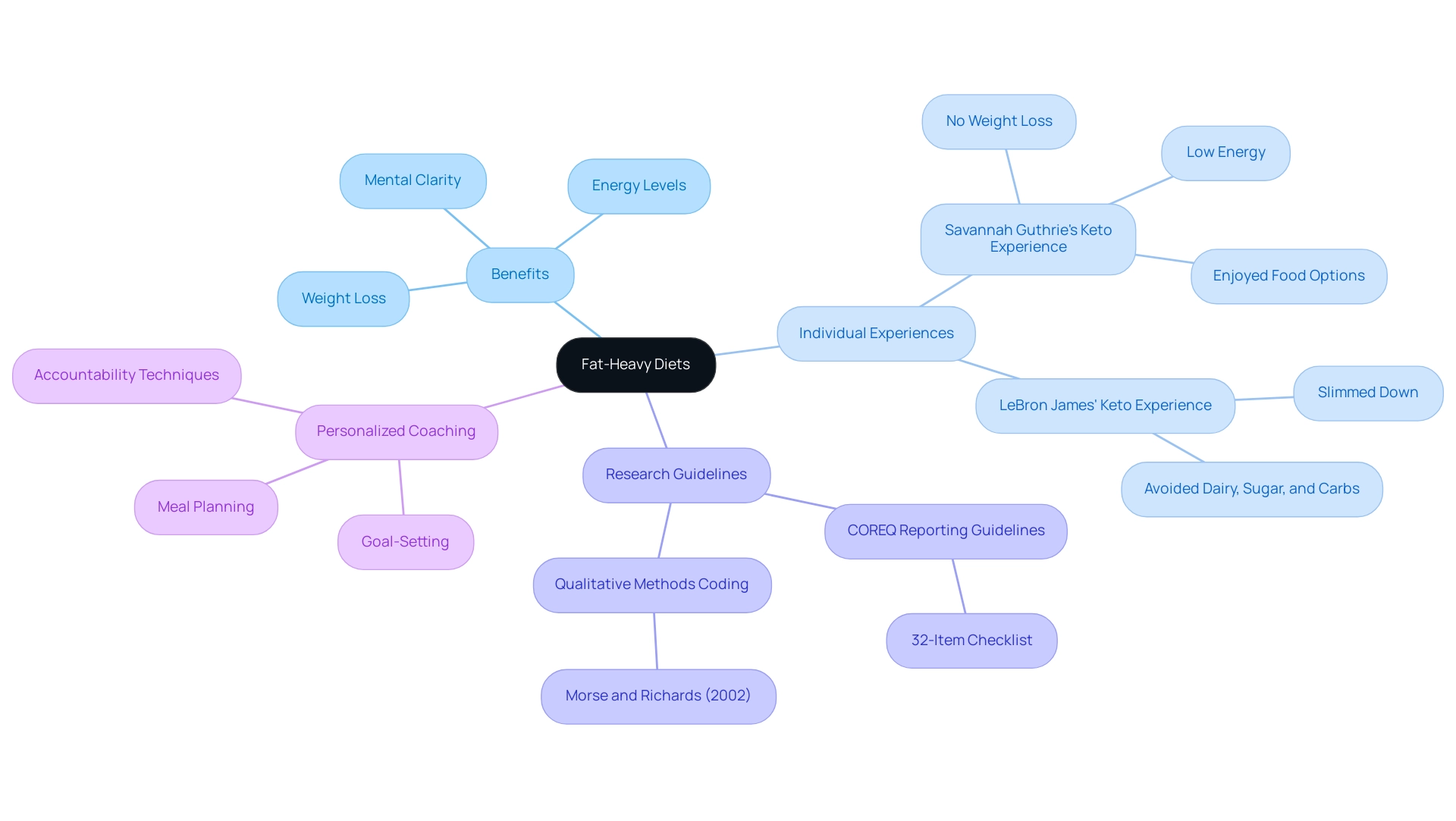
The Role of Healthy Fats in Weight Management
Nourishing oils, present in nutrient-dense foods like avocados, nuts, seeds, and oily fish, play a vital role in effective weight management. These beneficial lipids enhance satiety—helping to curb overeating—and support metabolic functions that facilitate burning. At Foresight Health Coaching, we emphasize the importance of customizing food choices to individual needs and objectives.
For example, while nutritionists observe that food oils may aid strength-oriented athletes, they could be less appropriate for endurance activities that depend significantly on carbohydrates for energy. Therefore, incorporating healthy fats thoughtfully into daily meals can empower individuals to create balanced diets that foster fullness and sustained energy. Starting the day with a nutrient-packed breakfast, such as a smoothie featuring avocado and nut butter, can maintain energy levels throughout the morning, enhancing productivity and focus.
This nutritional approach embodies our principle of quality over quantity, encouraging individuals to select nutrient-dense foods that align with their wellness aspirations. Furthermore, we recommend seeking guidance from a certified healthcare professional or registered nutritionist to tailor nutritional approaches to individual requirements and wellness goals. Understanding the role of healthy fats in weight management raises the question of whether eating fat burns fat, and it’s not just about making dietary choices; it’s about fostering a lifestyle that prioritizes overall well-being.
Foresight Coaching provides customized programs, including nutritional guidance, wellness workshops, and access to our wellness app, to assist individuals and corporate teams in reaching their wellness objectives. Our corporate memberships accommodate up to 30 employees and feature comprehensive services aimed at improving workplace wellness, facilitating HR Benefits Managers in executing effective wellness initiatives.
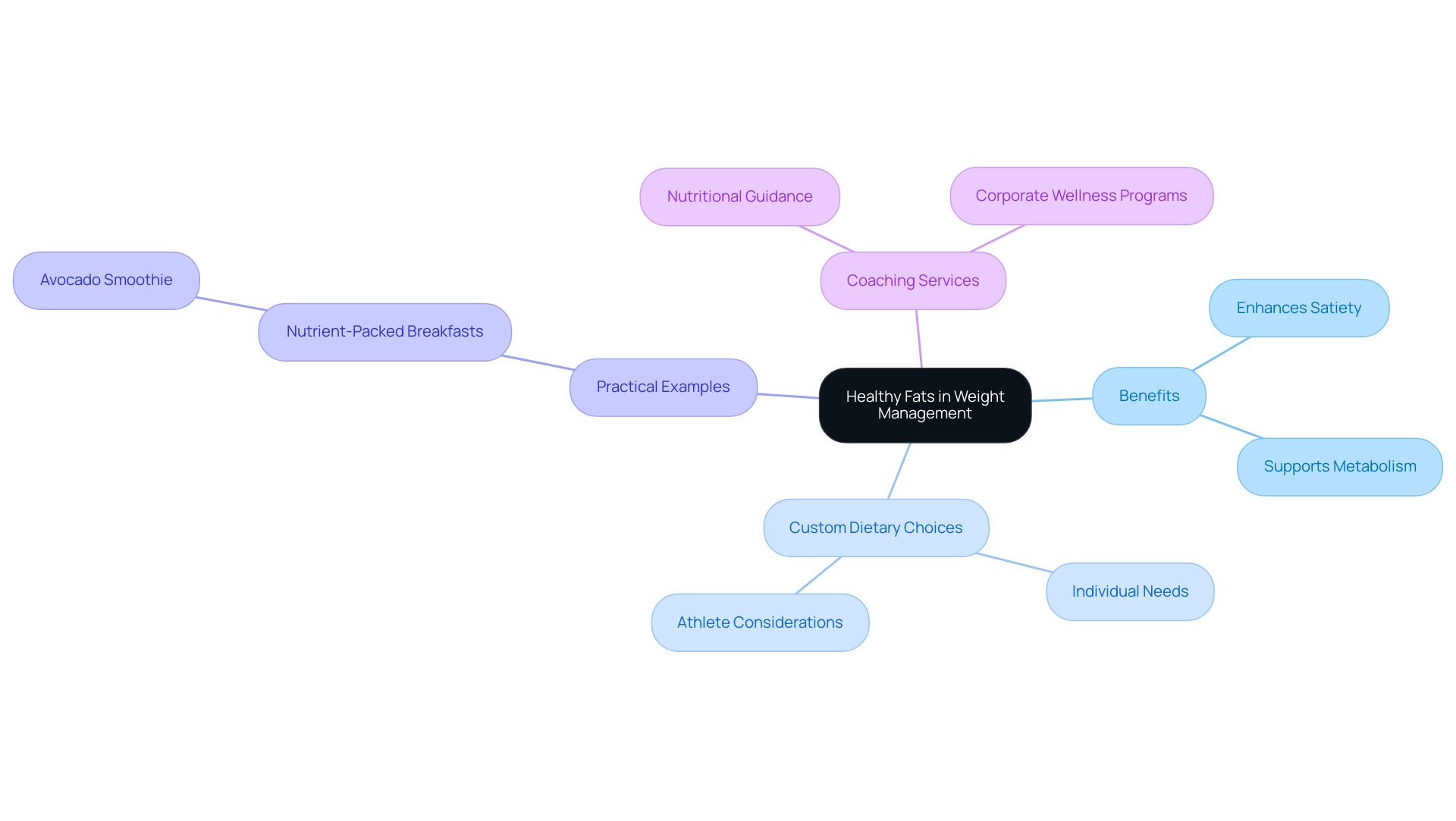
Common Misconceptions About Dietary Fat
Despite the growing acknowledgment of the advantages linked to nutritious oils, many enduring misunderstandings persist in obscuring our comprehension. A common misconception is that all lipids lead to weight gain; however, research studies show that beneficial lipids can actually promote weight loss, raising the question of whether eating fat burns fat by increasing feelings of fullness and aiding metabolic function. For example, lipids obtained from sources such as olive oil and avocados have been demonstrated to positively affect cholesterol levels, with a study published in the Journal of Nutrition indicating that participants who incorporated beneficial lipids into their diet saw significant enhancements in their cholesterol profiles.
This contradicts the belief that eating fat burns fat, as it invariably leads to higher cholesterol. Recent discoveries emphasize that adding these nutritious lipids to one's diet can result in enhanced cholesterol levels and better overall wellness. As Dr. Jane Smith, a prominent nutritionist, observes, 'Comprehending the importance of beneficial lipids is essential for attaining optimal well-being.'
By illuminating these misunderstandings, individuals can confidently adopt beneficial oils, promoting not only personal well-being but also supporting a culture of informed nutritional decisions in their workplaces. Ultimately, this understanding leads to a more vibrant and productive life.
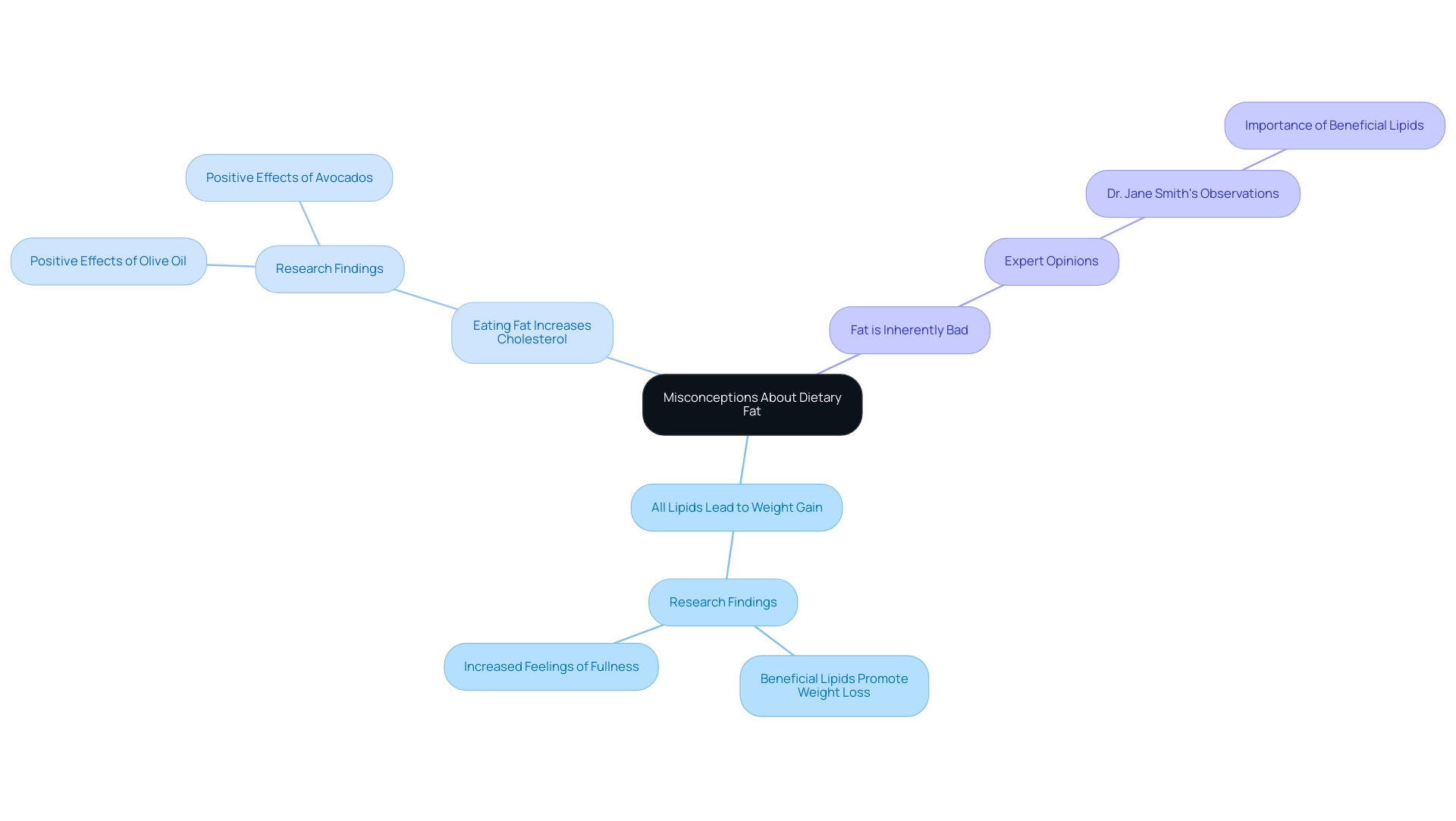
Strategies for Incorporating Healthy Fats into Your Diet
Incorporating beneficial oils into your diet can raise the inquiry of whether does eating fat burn fat, making the experience both easy and pleasurable while leading to improved well-being. Begin by swapping out traditional cooking oils for healthier alternatives, such as olive or coconut oil, which not only elevate the flavor of your dishes but also support heart health. Enhance salads or yogurt with a sprinkle of nuts and seeds, adding both texture and nutritional value.
Avocado can be a delightful addition to smoothies or serve as a creamy spread on toast, providing essential nutrients and beneficial monounsaturated oils. Furthermore, incorporating fatty fish like salmon or mackerel into your meals a couple of times a week can significantly boost your omega-3 intake, which Juárez-López et al. (2013) identified as beneficial in reducing insulin resistance in obese children.
It's important to remember that the brain is composed of 60% fat, prompting the inquiry: does eating fat burn fat, which highlights the essential role beneficial fats play in cognitive function. Additionally, a case study on European fat consumption patterns reveals that total fat intake generally exceeds the recommended 20-35%, with saturated fat consumption significantly above the recommended maximum of 10%. Recent efforts have led to a decrease in trans fatty acid intake across Europe, now below the recommended level.
These small yet impactful changes in your daily meals can lead to a substantial increase in healthy fat consumption, which raises the question: does eating fat burn fat, thereby fostering better wellness and enhancing performance both at work and in everyday life? Remember, as noted by Fabio J. Pacheco, 'If properly used, HRA constitutes a simple and highly valued tool to help address patient’s needs.' This serves as a reminder of the importance of promoting dietary well-being, not just for yourself but also for your team.
At Foresight Wellness Coaching, we provide customized wellness services that include nutritional guidance, coaching, and workshops aimed at enhancing your team's overall well-being. Our corporate memberships encompass in-person wellness discussions, extensive pantry services to enhance workplace eating habits, and access to our wellness app, ensuring continuous support and engagement. With our founders' unique backgrounds in high-performance coaching and a hybrid model of service delivery, Foresight Health Coaching is committed to providing a holistic approach to health and wellness.
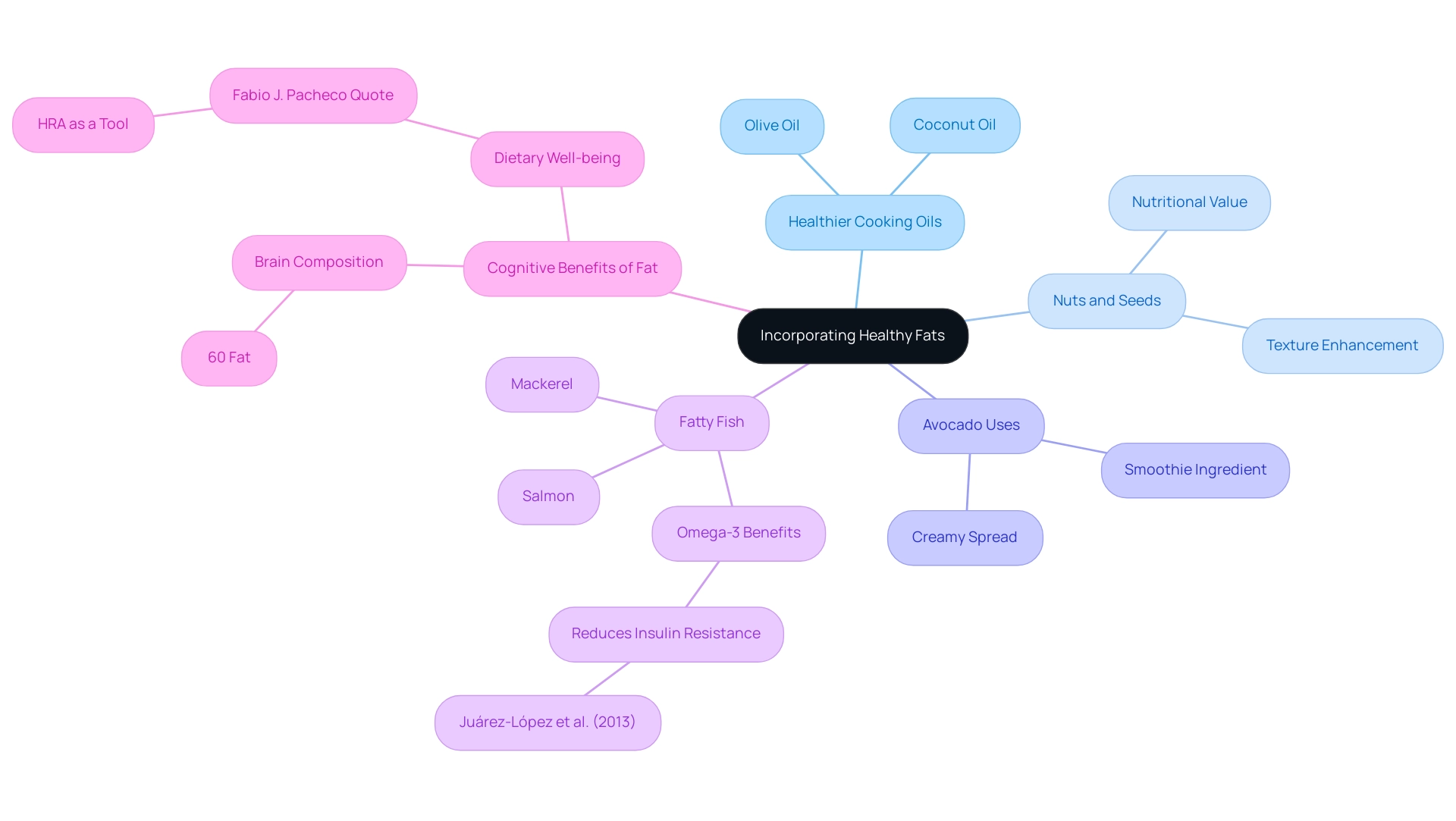
Conclusion
Incorporating healthy fats into daily diets is not only beneficial for personal health but also pivotal for fostering a productive workplace culture. The science of fat metabolism reveals how these nutrients play a crucial role in energy production and metabolic function, dispelling myths that all fats are harmful. By embracing dietary strategies that highlight the importance of healthy fats, individuals can experience improved weight management, heightened energy levels, and enhanced mental clarity.
Real-life success stories demonstrate the transformative impact of fat-heavy diets, emphasizing the importance of personalized approaches to nutrition. As HR Benefits Managers, advocating for these dietary principles can empower teams to make informed choices that enhance their overall well-being. By providing resources such as tailored coaching and wellness workshops, organizations can create an environment where health is prioritized, leading to sustained productivity and engagement.
Ultimately, understanding and integrating healthy fats into the workplace wellness strategy can inspire a culture of health that not only benefits individuals but also strengthens the organization as a whole. Now is the time to champion these dietary choices and pave the way for a healthier, more vibrant workforce.
Frequently Asked Questions
What is lipid metabolism?
Lipid metabolism is the process through which the body transforms consumed oils into essential components like fatty acids and glycerol, which are then utilized for energy production.
What is triacylglycerol and its significance?
Triacylglycerol is a fat molecule composed of three fatty acids linked to a glycerol molecule, highlighting the structural complexity of fats in the body.
How does the body respond to fat consumption?
Upon consuming fat, the body releases hormones such as glucagon, which is crucial for initiating fat breakdown.
What role does fat play in ketogenic diets?
In ketogenic diets, the body enters ketosis, relying primarily on fat as its main energy source instead of carbohydrates.
How can understanding lipid metabolism benefit individuals?
Understanding lipid metabolism helps individuals make informed nutritional choices that align with their well-being and weight loss goals.
What is the relationship between lipolysis and obesity?
Alterations in lipolysis are often linked to obesity, characterized by increased basal rates of lipolysis and reduced responsiveness to stimulation, which can promote insulin resistance and related disorders.
Why are healthy fats important for overall health?
Healthy fats provide energy, support vital cellular functions, and facilitate hormone production, contributing to enhanced overall well-being.
What dietary approach is emphasized in the Wild Diet?
The Wild Diet emphasizes whole, unprocessed foods and encourages the intake of healthy oils, such as those from avocados, nuts, and olive oil.
What benefits have participants reported from fat-heavy diets?
Participants in fat-heavy diets often report significant weight loss, increased energy levels, and improved mental clarity.
What factors can influence individual responses to dietary changes?
Individual experiences with diets can vary; for example, some may experience weight loss and energy gains, while others may not see similar results despite enjoying the food options.
What is the importance of customizing food choices?
Customizing food choices to individual needs and objectives is vital for effective weight management and overall health.
How can incorporating healthy fats into meals affect satiety?
Beneficial lipids enhance feelings of fullness, which can help curb overeating and support metabolic functions.
What misconceptions exist about dietary fats?
A common misconception is that all lipids lead to weight gain, while research shows that beneficial lipids can promote weight loss and improve cholesterol levels.
How can individuals incorporate healthy fats into their diets?
Individuals can swap traditional cooking oils for healthier options like olive or coconut oil, add nuts and seeds to meals, and include fatty fish like salmon for omega-3 intake.
What services does Foresight Health Coaching provide?
Foresight Health Coaching offers customized wellness services, including nutritional guidance, wellness workshops, and access to a wellness app to help individuals and corporate teams achieve their wellness goals.

